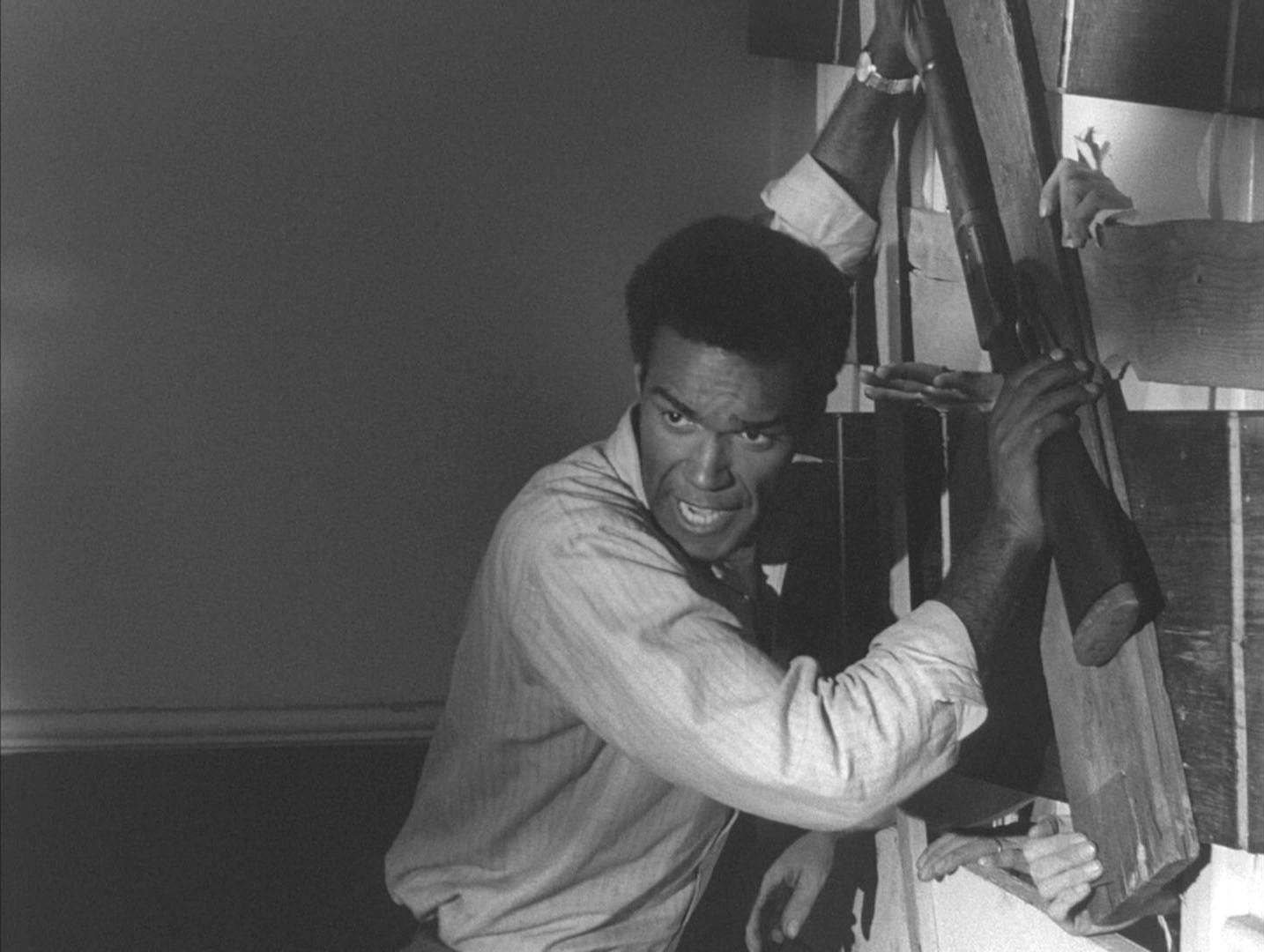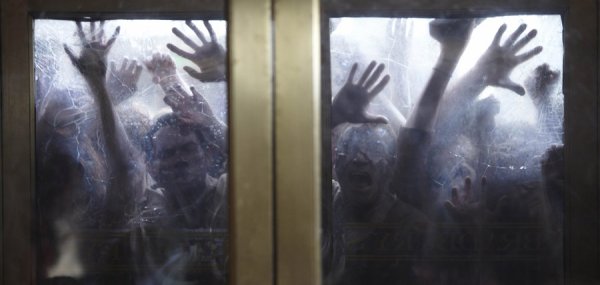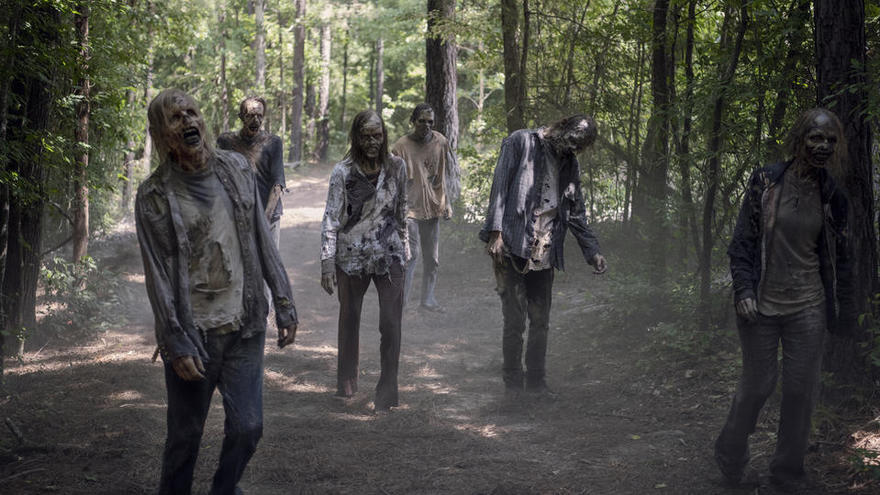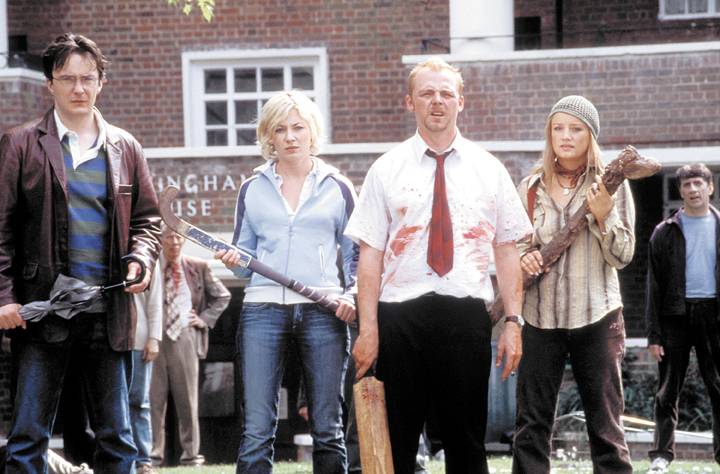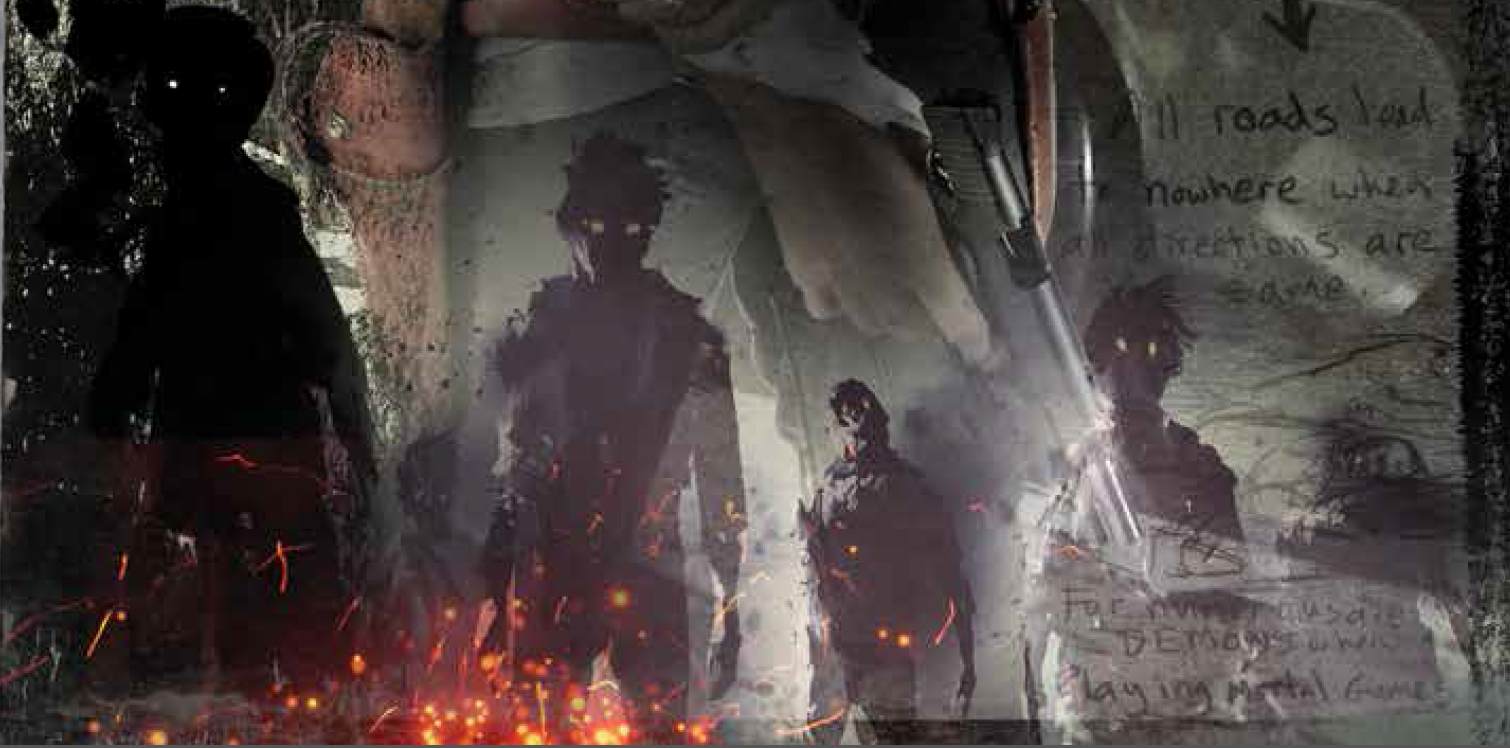Cover Stories: Eyes Up, Survivor
How long would you last in the zombie apocalypse?
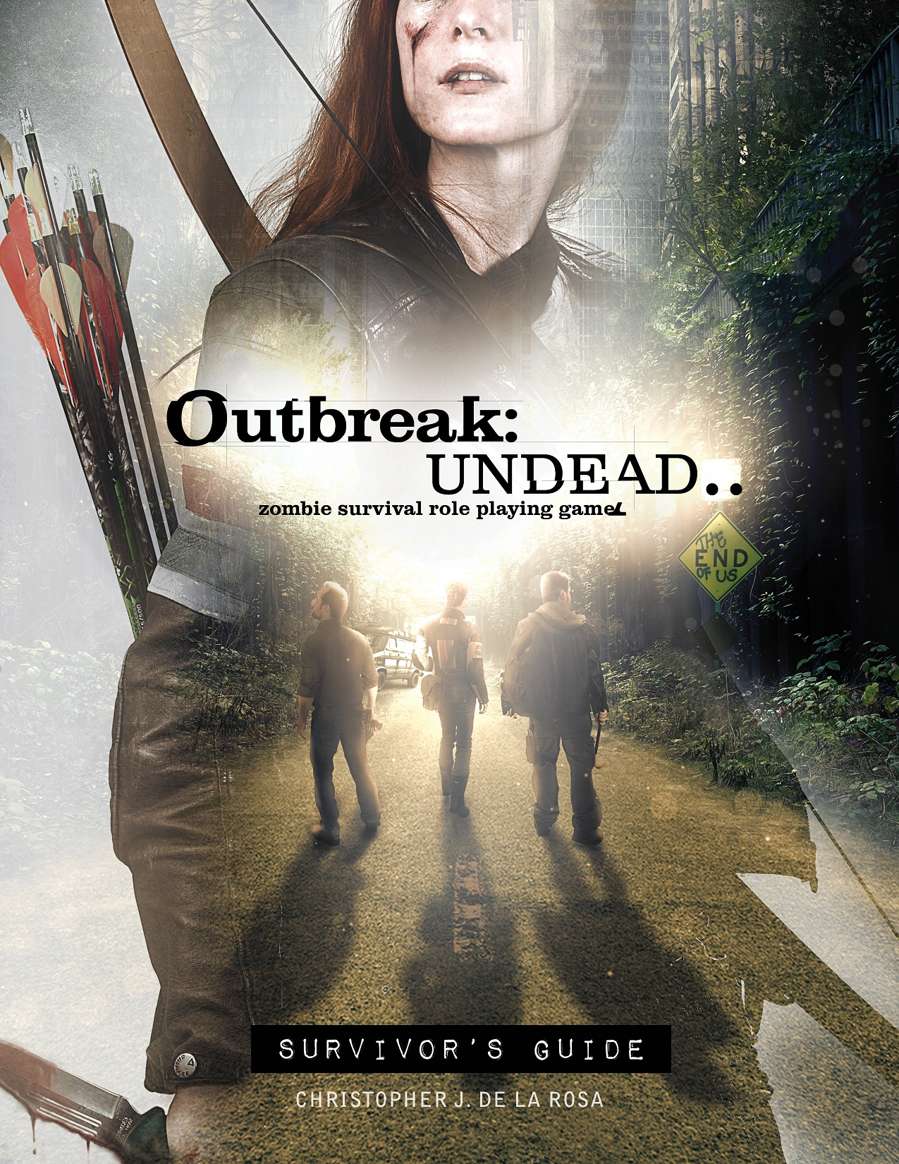 This is a question anyone who has ever watched a zombie horror film has asked themselves – usually after the first actually intelligent character gets killed by the zombie horde. After all, the zombie is not an individual threat in the modern zombie horror but rather an extension of an unending horde of shambling death, spurred forward by a drive to kill. Invariably, there comes a point in every zombie horror narrative where the characters whom we all implicitly know will die have done so, and then the first character we actually identify with winds up dying. Perhaps they are bit and must be put down before they turn. Maybe they do something heroic as their last act. Maybe they are just dragged off screaming, merely for shock value. Regardless, we stop and ask ourselves the same question: “How long would I last?”
This is a question anyone who has ever watched a zombie horror film has asked themselves – usually after the first actually intelligent character gets killed by the zombie horde. After all, the zombie is not an individual threat in the modern zombie horror but rather an extension of an unending horde of shambling death, spurred forward by a drive to kill. Invariably, there comes a point in every zombie horror narrative where the characters whom we all implicitly know will die have done so, and then the first character we actually identify with winds up dying. Perhaps they are bit and must be put down before they turn. Maybe they do something heroic as their last act. Maybe they are just dragged off screaming, merely for shock value. Regardless, we stop and ask ourselves the same question: “How long would I last?”
This was the question I and my friends were forced to ask ourselves late one night in a conference room at Gen Con 2009. Having been my first Gen Con, the sheer press of being surrounded by tens of thousands of gamers had bewildered my senses and left me filled with a sort of manic elation which resulted in me wandering around the convention near to midnight looking for something to do. My friend Mark and I had unceremoniously been denied entry into a NERO boffer event, having been told that it was for teams only, and despite us finding a team eager to have two competition level fencers and experienced boffer fighters to die happily at their side, we were civilly informed that our tickets would not be accepted. Yet as luck would have it, our mutual friend John let us know about a demo going on that he was signed up for which was looking for more players.
And so, this is how Mark and I joined the 2009 demo of Outbreak: Undead.
Thriving On Existential Dread
Outbreak: Undead is a tabletop roleplaying game released by Hunters Books and Apparel in 2010, with a second edition co-published in 2018 by Renegade Games and Hunters Entertainment. It is an RPG simulation of survival during the outbreak of a zombie apocalypse.
Laser-focused on the concept of team work and survival against ever-increasing desperation, Outbreak: Undead uses a comprehensive character sheet with a percentile system to determine degrees of success or failure when either attempting a dangerous task, or a general task wherein a measure of success might shift the odds of later survival. Action is handled through rolling a check against a Skill value which correlates to one of the game’s four Attributes. The Second Edition version of the rules even features color-coordinated text for degree of difficulty within the universe of the narrative, ranging from rules-light “Arcade Mode” to the nickel-and-dime grind of “Survivalist”. The game itself is expansive and its focuses on a modular design allows it to be applied to many different outbreak and survival scenarios. Where the game truly flourishes, however, is as an immersive TTRPG for a zombie apocalypse.
Starting with George Romero’s seminal cinematic masterpiece of Night of the Living Dead in 1968, the zombie apocalypse has grown to become a hefty staple of the horror genre. Every year new forms of zombie apocalypse horror media are created, be they films, novels, video games, or comic books.
The obsession with the horror of the zombie is ubiquitous to the modern world, and indeed if there is one monster who truly represents the fear and anxiety of the late 20th, early 21st century, it is the zombie. And as with our ever-changing modern world, the rules of the zombie apocalypse shifts with every new iteration of the story.
Outbreak: Undead wisely takes note of this, and focuses not on the specific rules of the undead which threaten the survivors who make up the player characters of the game, but on the toll which survival takes on those survivors. It is this focus where Outbreak: Undead shines.
The Gameplay
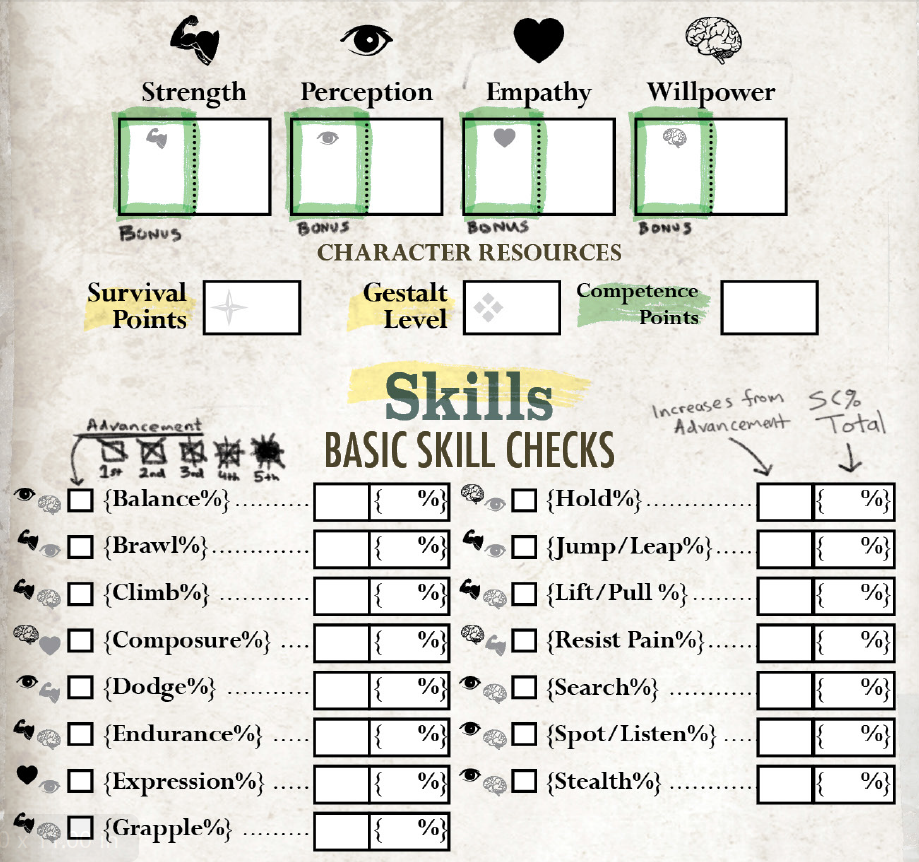 Outbreak: Undead uses a central mechanic called SPEW, named after the four traits of player characters in the game: Strength, Perception, Empathy, and Willpower. Players either use the SPEW AI to build themselves using an online survey, or they can construct different survivors using a point buy system. The game then uses these traits to generate a series of Skill values, each presenting the value you are aiming to roll under when making a percentile check. Roll under, and you succeed. Roll over, and you fail. For every value of ten you succeed or fail by, your success or failure is that much more pronounced, to a total of five degrees of either. As one might expect, Gear is a major factor in survival, and relevant Gear in the game adds directly to the target value of the check.
Outbreak: Undead uses a central mechanic called SPEW, named after the four traits of player characters in the game: Strength, Perception, Empathy, and Willpower. Players either use the SPEW AI to build themselves using an online survey, or they can construct different survivors using a point buy system. The game then uses these traits to generate a series of Skill values, each presenting the value you are aiming to roll under when making a percentile check. Roll under, and you succeed. Roll over, and you fail. For every value of ten you succeed or fail by, your success or failure is that much more pronounced, to a total of five degrees of either. As one might expect, Gear is a major factor in survival, and relevant Gear in the game adds directly to the target value of the check.
In order to represent complications to a check (naturally), the game also uses color-coded d6’s with a catch to modify a roll, representing for instance, the increased Difficulty of environment, Depletion of gear, and even Injuries as your survivor invariably grows more hurt. The final piece of the puzzle when making a check in Outbreak: Undead comes from Gestalt: a means to represent relevant experience had by the character which exists outside the rest of the rules of the game. This can mean anything from common internet memes on messenger boards when the world went dark to being able to balance a healthy diet from canned goods. Gestalt becomes d6s you can assign during character creation or during play and serve to improve your roll, rather than detract from it.
Now, as for that ‘catch’ part of the ‘d6s with a catch’. The catch is that each of these d6’s only count their values of 1 to 5. If a player rolls a 6, the die “explodes”, counting as both a value of 5 and adding another die of its type to the roll. This creates an incredibly dynamic and unpredictable resolution to nearly any action in the game, though especially so in combat. Combat in Outbreak: Undead is as fast as it is brutal, befitting the world it attempts to convey. As with most zombie-based environments avoiding combat entirely is generally the smart choice, but when one must fight, it is best to do it with all the odds stacked in your favor.
Teambuilding At The Edge Of The World
While the Outbreak: Undead core rules provide the means to generate a Survivor from any concept, it is the experience of placing yourself into the survival scenario of the game where the innate potential of Outbreak: Undead is truly revealed. The use of the SPEW AI to generate yourself into the rules of the game immediately invests you in the safety of your character, even though the tagline for the game itself makes the intention clear: “Your zombie survival plan will fail.” For me, it was one of the most memorable moments of a Gen Con which was filled with memorable moments, such as my first Legend of the Five Rings pubcrawl or winning the 2009 D&D Open World Championship. Yet to properly tell that story, it’s necessary to expound on one more thing that Outbreak: Undead gets masterfully right: teamwork.
Picture if you will that moment that I, John, and Mark each went through our SPEW AI creation. Mark, a computer engineer with a penchant for firearms and martial arts, seemed like a natural shoe-in for Best Survivor at the Table. John, also a computer engineer but much more importantly, someone who had grown up working on cars and houses, brought to the table a separate set of skills implicitly vital to survival in the apocalypse. And then…there was me. Sure, I had studied martial arts and fencing, but I was a writer who worked as a travel planner and researcher for those wealthy enough to have a black rectangle of titanium in their wallet that had no credit limit attached. What exactly did I offer the group’s chances at surviving the end of the world?
As it turns out, Outbreak: Undead put a great deal of emphasis on soft skills too, such as being able to talk to people effectively and having an eye for detail – something I would come to learn over the next two hours. As we sat down to play our first game of Outbreak: Undead, the mental checklists started. We were a table of 10-12 players, many of whom were individuals or a couple. Who was going to make it out alive? The scenario began with us split into different groups, running out of gas and arriving at a farmhouse all roughly at the same time – and barely ahead of the first wave of the infected. We had limited time to shore up the house against the horde, and these were the people we had to do it with. Most of them were complete strangers, people we could not trust save to act in their own self-interest. Some had secrets. Some were already working against the greater good of the whole. Survival seemed impossible, until something magical happened.
Mark looked at me, and went “Team Gunmetal?”
What followed not only solidified the night as an RPG experience to remember but also had a direct hand in the development of the RPG itself.
Team Gunmetal was a reference to strategy we had employed during a past boffer LARP, coincidentally set during a zombie apocalypse. Faced with a very similar situation as that game table, Mark and I divided the players into two teams. Team Gunmetal was the team Mark was in charge of, named such because, well, ‘Team Gunmetal’ just sounded awesome. It appealed immediately to the players looking for glory, the players looking to prove themselves against all odds – the exact sort of players whom could create personal fun at the expense of those around them. Mark then dubbed the team I took over as ‘Team GetsKilled’, a move which rankled some but further drove home the divide in players. Team GetsKilled took the risks for the greater good. Team Getskilled was not in it for the glory. Team GetsKilled was in it to spite the people who named them such, and to prove that the real name was Team GetSkilled.
As it turned out, this strategy worked wonders at our table of Outbreak: Undead. Within the hour, Team Gunmetal and Team GetsKilled had broken down furniture into makeshift spears, located every single possible weapon in the house, and were running regular patrols around the outside of the house to destroy stragglers of the horde. We developed an effective method of taking out the undead, with designated Sweepers to take them to ground and Stabbers to destroy the brain once they were down. Barring an incident where one of Gunmetal’s more problematic members dropped a bureau out of a second story window nearly onto my head (prompting me to demand the shout of “Danger Close!” as future protocol for such risky actions), the first 90 minutes of the demo was a resounding success. So much so that our efforts directly led to the game incorporating the idea of Formations into the gameplay experience.
Then the horde came.
This is where the rubber hits the road of Outbreak: Undead, and where the greatest challenge to survival comes. Even with teamwork, formations, equipment, and tactics, there is only so much one can do against the tide of death coming for them.
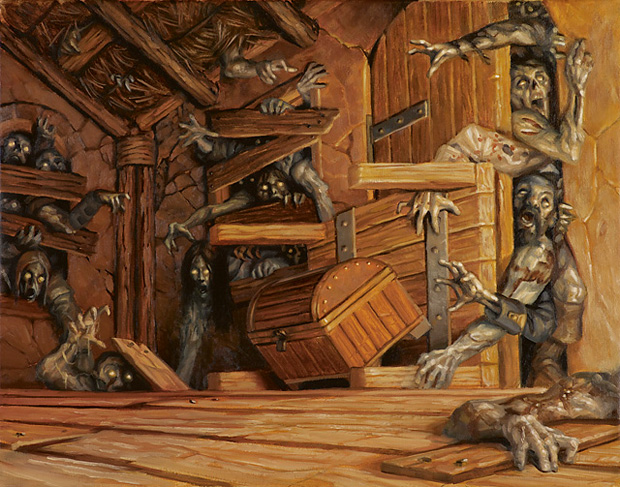 For Teams Gunmetal and GetsKilled, we held out against the horde long enough for one of the special undead to arrive, requiring us to coordinate as a full group and throw everything we had at it. We lost a couple of our group in that fight, and though we were able to take the hulking brute down, the damage to the farmhouse rendered it unsafe for continued survival. With our wounded in tow, including our friend John, we got to the gassed up vehicles and fled into the night.
For Teams Gunmetal and GetsKilled, we held out against the horde long enough for one of the special undead to arrive, requiring us to coordinate as a full group and throw everything we had at it. We lost a couple of our group in that fight, and though we were able to take the hulking brute down, the damage to the farmhouse rendered it unsafe for continued survival. With our wounded in tow, including our friend John, we got to the gassed up vehicles and fled into the night.
We had survived our first encounter with the zombie apocalypse, but our illusions had been left behind. We knew we were on borrowed time, and that survival was, at best, a gamble against the house. And eventually, the house always wins.
Where The Road Gets Bumpy
For all of its positive qualities, the one criticism I would lay at Outbreak: Undead, is how its rulebook is presented. The game itself generates an immediately immersive experience, presenting various printouts, photos, hand-written notes, and any number of different pieces of media to describe its purpose. It does take that immersion too far in some cases, however, and in particular I found the Second Edition book a more difficult read than the original rules for that reason. While certainly more polished and of an undeniably higher production value, the constant switch between various print types and presentation styles was jarring and difficult to follow. For some, especially people given to difficulty with focus and attention processing, this presentation of the rules becomes a dense barrier between them and the fun of the game. The Quick-Start Guide available on the publisher’s website corrects much of this, and it would be something I would recommend for anyone finding the main rules challenging to comprehend.
The Takeaway
If you are looking for an immersive, challenging experience to answer the question of “How long would I last in a zombie apocalypse?”, there is no better game on the market than Outbreak: Undead by Hunters Entertainment and Renegade Game Studios. But when you play it, heed the lessons of Teams Gunmetal and Team GetsKilled: work hard, work together, and always keep an eye on your exit. If you’re lucky, you might just live to die another day.
David Gordon is a contributor to the site. A storyteller by trade and avowed tabletop veteran, he is always on the lookout for creative tabletop games. He can be reached on Twitter.
You can discuss this article and more on our social media!
Photo Credits: Outbreak: Undead images by Renegade Game Studios and Hunters Entertainment; Night of the Living Dead by Criterion; The Walking Dead by AMC; Army of the Damned by Wizards of the Coast; Shaun of the Dead by Rogue Pictures

